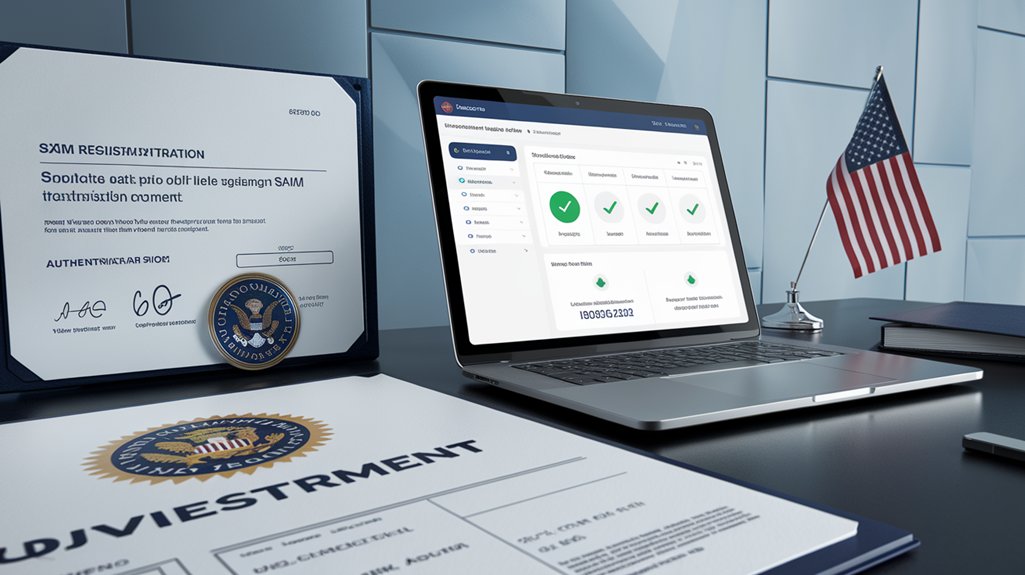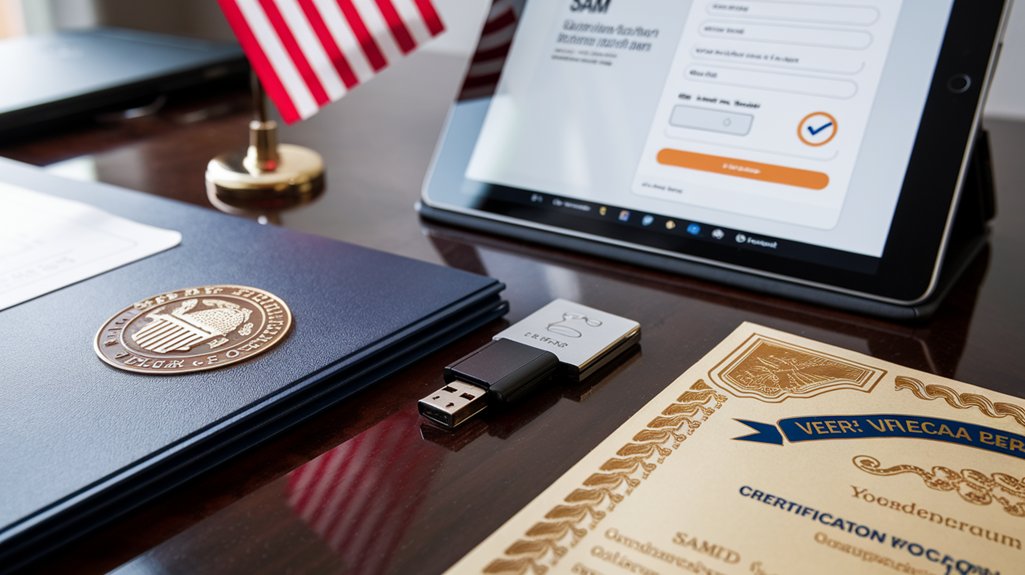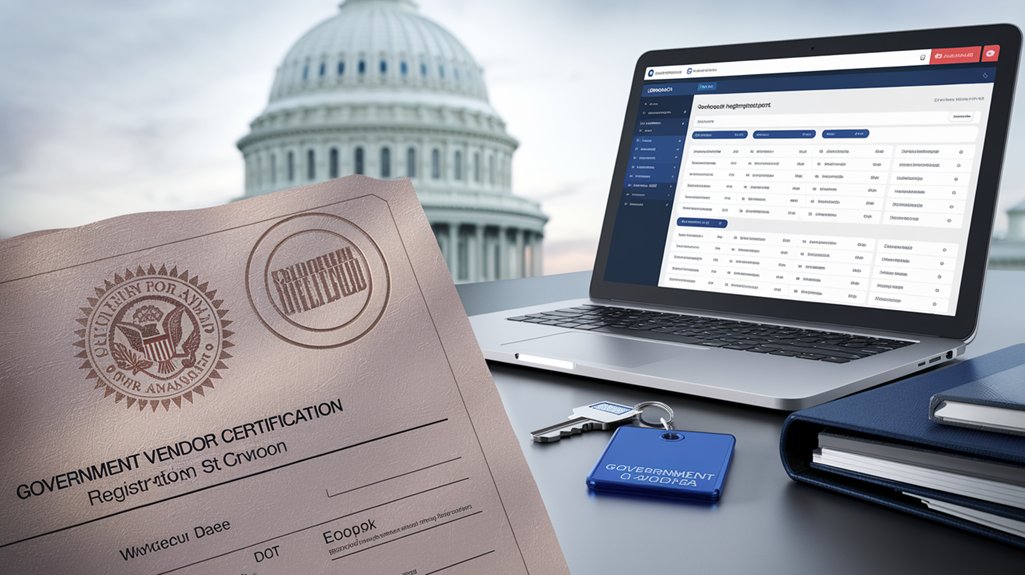SAM registration serves as official proof of government vendor legitimacy through its validation process. The system verifies business credentials, assigns a unique entity ID, and confirms tax information against federal databases. Registered vendors gain a verified status that federal agencies recognize and trust when awarding contracts. Active registration status, which requires annual renewal, demonstrates ongoing compliance with federal contracting standards. Proper registration documentation provides concrete evidence of eligibility for government procurement opportunities.
The Role of SAM Registration in Government Vendor Verification

When businesses seek to engage in federal contracting, SAM registration serves as the mandatory first step in establishing vendor legitimacy. This federal requirement guarantees proper Vendor Authentication through an extensive validation process that assigns each entity a unique identifier.
SAM Compliance involves thorough documentation review to verify an organization’s existence and business credentials. The system independently validates the entity’s information, confirming its legitimacy and reducing the risk of fraud in government contracting. Maintaining accurate registration data is crucial to avoid potential legal and financial consequences. This verification process typically takes up to seven calendar days when all documentation is correctly submitted. Registration status can be tracked using the Entity Status Tracker throughout the process.
Despite being cost-free, maintaining active status requires regular renewal and updates to guarantee continued eligibility for contract awards, grant applications, and federal payments through systems like ASAP.
Essential Components of a Legitimate SAM Registration

To establish a valid presence in the federal procurement system, businesses must include several critical elements in their SAM registration. Registration accuracy begins with the Unique Entity ID (UEI), which has replaced the DUNS number as the primary identifier for federal entities.
Legitimate registrations require precise legal business names matching official records, correct EIN/TIN verification, and accurate physical address information. Compliance requirements mandate annual renewal to maintain active status, with updates to organizational information such as banking data and business size classification. Annual renewal is essential as failure to renew can result in loss of eligibility for federal contracts and grants.
For federal award eligibility, registrants must submit detailed organizational information including business type, NAICS codes, and designated points of contact. Federal contracting opportunities can significantly boost small business revenue through increased visibility in government procurement channels.
Additionally, robust security measures protect the registration process through secure credentials and authentication protocols, preventing fraudulent activity and ensuring only authorized representatives can modify entity profiles.
Leveraging Your SAM Registration for Federal Contract Opportunities

A properly completed SAM registration opens the gateway to billions of dollars in federal contract opportunities annually.
While SAM.gov serves as the central portal for government contracts, vendors should recognize that only about 5% of federal opportunities are posted there.
Streamlined compliance processes make it easier for businesses to maintain required federal regulations while reducing administrative overhead.
Effective federal contract strategies include monitoring SAM.gov daily for solicitations, exploring GSA Schedules, and registering with complementary databases like DSBS and SubNet.
SAM.gov benefits extend beyond just finding opportunities—vendors can access 45,000+ monthly contract data reports, allowing for targeted market research and competitive analysis.
For maximum visibility, vendors should also explore subcontracting through larger prime contractors and specialty registries like FEMA’s Disaster Response Registry, particularly for emergency-related contracts that might bypass standard posting requirements. In 2023, approximately 55% of award dollars went through contract vehicle task orders that aren’t typically advertised on SAM.gov.
Frequently Asked Questions
How Long Does SAM Registration Verification Typically Take?
SAM registration verification typically takes 2-8 weeks to complete.
The SAM timeline varies based on several factors, including business structure complexity and information accuracy.
The registration process involves multiple verification steps, including CAGE code and IRS validation, which alone requires 7-12 business days.
Technical issues, documentation errors, or high processing volumes may extend verification times.
Organizations can monitor their registration status directly through SAM.gov and should prepare all required documents in advance to minimize delays.
Can Foreign Entities Register With SAM.Gov?
Yes, foreign entities can register with SAM.gov. The international registration process requires these additional steps:
- Obtain a DUNS number for each physical location.
- Secure an NCAGE code for each DUNS number.
- Complete the standard online registration at SAM.gov.
Foreign businesses must provide documentation and comply with U.S. regulations.
While registration is free for all entities, international applicants may face challenges with language barriers and documentation requirements.
What Happens if I Miss My Annual SAM Renewal Deadline?
Missing an annual SAM renewal deadline results in immediate ineligibility for federal contracts, grants, and payments.
The renewal consequences include disqualification from bidding opportunities and potential stoppage of payments on existing contracts.
Late registration requires complete revalidation through multiple federal agencies, causing significant processing delays.
Even a one-day lapse can legally disqualify an entity from contract awards.
Organizations should monitor expiration dates closely and renew early to avoid these disruptions.
Are There Industry-Specific Requirements for SAM Registration?
Yes, industry-specific requirements exist within SAM registration processes.
Businesses must select appropriate NAICS codes that accurately reflect their operations and capabilities.
Industry standards are incorporated through Product Service Codes (PSCs), which categorize specific goods and services offered.
Some sectors, particularly defense or international trade, require additional credentials like NCAGE codes.
Financial information requirements may vary by industry size and type, ensuring proper classification within the government procurement system.
How Do I Update Banking Information on My Existing SAM Registration?
To update banking information in an existing SAM registration, users must log into SAM.gov with their credentials and select “Update/Renew My Entire Registration.”
Navigate to the Financial Information section within the registration process to modify banking details. Users should enter the new routing and account numbers carefully, verify all information for accuracy, and save changes.
After completion, the system will process banking updates and may require additional verification before finalizing changes.